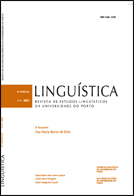Dimensions of justification in legislative discourse: a diachronic approach
Abstract
In this paper I intend to analyse some aspects of the evolution observable in the way the legislative discourse justifies the legal-legislative provisions in legislative texts of different synchronies of the Portuguese language: this is especially apparent when they present statements which contain acts of discourse with justification value. From a comparative and diachronic perspective, I will confront Afonso X’s medieval legislative texts (such as the Portuguese versions of the Primeyra Partida and the Foro Real) with contemporary Portuguese legislative texts. I will attempt to demonstrate that in medieval legislative texts, in addition to the greater extent of the supporting segments, there is also a discursive structure that uses arguments of authority. In Afonso X’s legislative texts royal legislation is conveyed and the Speaker, designated by the first person “we”, is identified with the king, holding a power inherent to this statute. It reaffirms its status as authority and the desirability of royal legislative action and affirms the pragmatic need for the existence of justice by its favourable effect (which is ethically identified with the Common Good). By contrast, contemporary legislative discourse is presented in the third person and this does not designate any individualized subject. The law is stabilized, established in multi-secular institutions and fundamental rights are already guaranteed, and new legislation is generally conjunctural and especially case-by-case legislation. In contemporary legislative formulations there is no discourse of the legitimization of power and the dimension of the supporting segments is smaller.
References
Amossy, R. 1999. La notion d’ethos de la rhétorique à l’analyse de discours. In: J-M. Adam; R. Amossy & M. Dascal (Eds.). Images de soi dans le discours. Lausanne: Delachaux et Niestlé, 9-30.
Barros, C. 2010. Versões portuguesas da legislação de Afonso X Estudo linguísticodiscursivo. Porto: U. Porto Editorial.
Barros, C. 2012. Tradição, normatividade e especificidade: estruturação discursiva de textos legislativos medievais. In: Textos Selecionados do XXVII Encontro Nacional da Associação Portuguesa de Linguística. Lisboa: APL, 79-97.
Carapinha, C. 2013. Comunicação e justiça – o texto legislativo. In: Justiça e Comunicação: o diálogo (im)possível. Coimbra: Imprensa da Universidade de Coimbra, 81-113.
Carapinha, C. 2018. A linguagem jurídica. Contributos para uma caracterização dos Códigos Legais. Redis, Revista de Estudos do Discurso. 7: 91-119.
Carmo, R. (org.) 2012. Linguagem, Argumentação e Decisão Judiciária. Coimbra: Coimbra Editora.
Carvalho Homem, A. 2017. O Rei e a Lei. Estudos de História Institucional da Idade Média Portuguesa (1279-1521). Porto: U. Porto Editorial.
Cornu, G. 2005. Linguistique Juridique.3e ed. Paris: Montchrestien.
Fonseca, J. 2001. Língua e Discurso. Porto: Porto Editora.
Gilissen, J. 2016. ( trad.) A. M. Hespanha & L. M. Macaísta Malheiros. Introdução histórica ao direito. 8ª ed. Lisboa: Fundação Calouste Gulbenkian.
Mattoso, J. 2015. Identificação de um país: oposição, composição: ensaio sobre as origens de Portugal, 1096-1325. Lisboa: Temas e debates.
Miranda, J. 2004. As Constituições Portuguesas de 1822 ao texto actual da Constituição. 5ª ed. Lisboa: Petrony.
Wroblewski, J. 1988. Les langages juridiques: une typologie. Droit et Sociéte. Revue Internationale de Théorie du Droit et de Sociologie Juridique. 8 : 13-26.
Downloads
Published
Issue
Section
License
Copyright (c) 2021 Linguística: Revista de Estudos Linguísticos da Universidade do Porto

This work is licensed under a Creative Commons Attribution-NonCommercial 4.0 International License.



